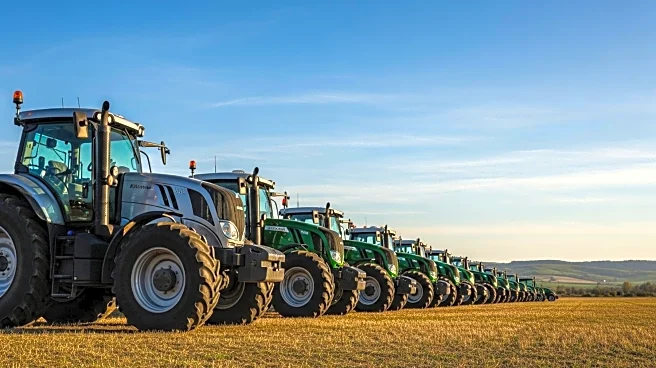What's Happening?
Farmers in the UK, organized under the group Farmers to Action, are planning a tractor convoy to the Labour Party Conference in Liverpool. This protest is in response to proposed changes in inheritance tax laws that would affect agricultural assets. The changes, set to take effect in April 2026, would tax inherited agricultural assets worth more than £1 million at a rate of 20%, which is half the usual rate. The government claims that these changes will only impact the 500 wealthiest farms annually, while the Country Land and Business Association estimates that up to 70,000 farms could be affected. Farmers argue that these tax changes, combined with challenging weather conditions, are putting significant strain on the agricultural sector.
Why It's Important?
The proposed inheritance tax changes have sparked significant concern among farmers, who fear that the financial burden could lead to the sale of family farms. This situation highlights the broader challenges facing the agricultural sector, including economic pressures and environmental factors like prolonged dry weather. The government's stance is that the tax changes will primarily affect wealthier estates and that the revenue generated will support public services. However, farmers argue that the cumulative impact of these changes could threaten the viability of many farms, potentially leading to a reduction in agricultural production and affecting food security.
What's Next?
The Farmers to Action group plans to continue their protest by driving tractors from various parts of the UK to the Labour Party Conference. This demonstration aims to draw attention to the farmers' plight and influence public opinion and policy decisions. The government may face increased pressure to reconsider or modify the proposed tax changes, especially if the protest gains significant public and media attention. The outcome of this protest could have lasting implications for agricultural policy and the future of farming in the UK.
Beyond the Headlines
The protest underscores a deeper tension between government fiscal policies and the sustainability of traditional farming practices. It raises questions about the balance between taxation and the preservation of rural livelihoods. The situation also highlights the need for policies that support the agricultural sector in adapting to environmental changes and economic challenges, ensuring long-term food security and rural community stability.









